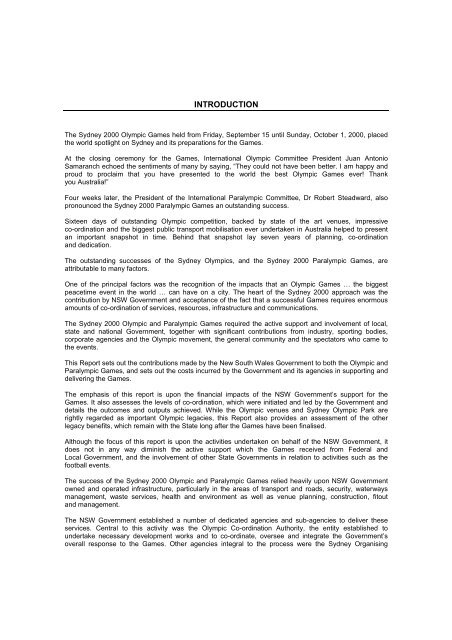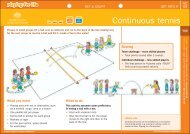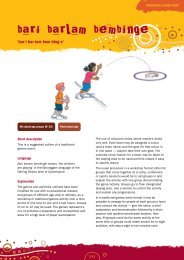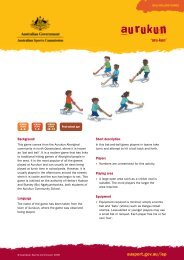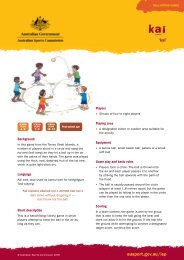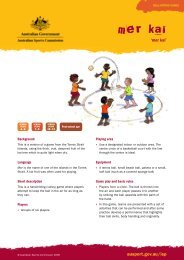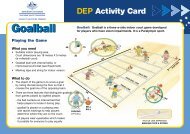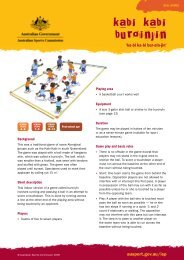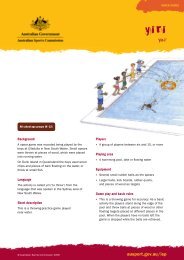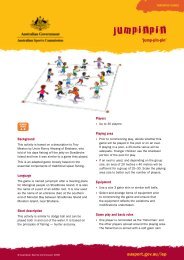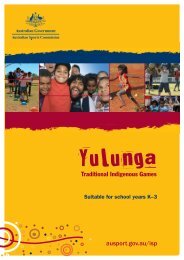the sydney 2000 olympic and paralympic games - Australian Sports ...
the sydney 2000 olympic and paralympic games - Australian Sports ...
the sydney 2000 olympic and paralympic games - Australian Sports ...
You also want an ePaper? Increase the reach of your titles
YUMPU automatically turns print PDFs into web optimized ePapers that Google loves.
INTRODUCTION<br />
The Sydney <strong>2000</strong> Olympic Games held from Friday, September 15 until Sunday, October 1, <strong>2000</strong>, placed<br />
<strong>the</strong> world spotlight on Sydney <strong>and</strong> its preparations for <strong>the</strong> Games.<br />
At <strong>the</strong> closing ceremony for <strong>the</strong> Games, International Olympic Committee President Juan Antonio<br />
Samaranch echoed <strong>the</strong> sentiments of many by saying, “They could not have been better. I am happy <strong>and</strong><br />
proud to proclaim that you have presented to <strong>the</strong> world <strong>the</strong> best Olympic Games ever! Thank<br />
you Australia!”<br />
Four weeks later, <strong>the</strong> President of <strong>the</strong> International Paralympic Committee, Dr Robert Steadward, also<br />
pronounced <strong>the</strong> Sydney <strong>2000</strong> Paralympic Games an outst<strong>and</strong>ing success.<br />
Sixteen days of outst<strong>and</strong>ing Olympic competition, backed by state of <strong>the</strong> art venues, impressive<br />
co-ordination <strong>and</strong> <strong>the</strong> biggest public transport mobilisation ever undertaken in Australia helped to present<br />
an important snapshot in time. Behind that snapshot lay seven years of planning, co-ordination<br />
<strong>and</strong> dedication.<br />
The outst<strong>and</strong>ing successes of <strong>the</strong> Sydney Olympics, <strong>and</strong> <strong>the</strong> Sydney <strong>2000</strong> Paralympic Games, are<br />
attributable to many factors.<br />
One of <strong>the</strong> principal factors was <strong>the</strong> recognition of <strong>the</strong> impacts that an Olympic Games … <strong>the</strong> biggest<br />
peacetime event in <strong>the</strong> world … can have on a city. The heart of <strong>the</strong> Sydney <strong>2000</strong> approach was <strong>the</strong><br />
contribution by NSW Government <strong>and</strong> acceptance of <strong>the</strong> fact that a successful Games requires enormous<br />
amounts of co-ordination of services, resources, infrastructure <strong>and</strong> communications.<br />
The Sydney <strong>2000</strong> Olympic <strong>and</strong> Paralympic Games required <strong>the</strong> active support <strong>and</strong> involvement of local,<br />
state <strong>and</strong> national Government, toge<strong>the</strong>r with significant contributions from industry, sporting bodies,<br />
corporate agencies <strong>and</strong> <strong>the</strong> Olympic movement, <strong>the</strong> general community <strong>and</strong> <strong>the</strong> spectators who came to<br />
<strong>the</strong> events.<br />
This Report sets out <strong>the</strong> contributions made by <strong>the</strong> New South Wales Government to both <strong>the</strong> Olympic <strong>and</strong><br />
Paralympic Games, <strong>and</strong> sets out <strong>the</strong> costs incurred by <strong>the</strong> Government <strong>and</strong> its agencies in supporting <strong>and</strong><br />
delivering <strong>the</strong> Games.<br />
The emphasis of this report is upon <strong>the</strong> financial impacts of <strong>the</strong> NSW Government’s support for <strong>the</strong><br />
Games. It also assesses <strong>the</strong> levels of co-ordination, which were initiated <strong>and</strong> led by <strong>the</strong> Government <strong>and</strong><br />
details <strong>the</strong> outcomes <strong>and</strong> outputs achieved. While <strong>the</strong> Olympic venues <strong>and</strong> Sydney Olympic Park are<br />
rightly regarded as important Olympic legacies, this Report also provides an assessment of <strong>the</strong> o<strong>the</strong>r<br />
legacy benefits, which remain with <strong>the</strong> State long after <strong>the</strong> Games have been finalised.<br />
Although <strong>the</strong> focus of this report is upon <strong>the</strong> activities undertaken on behalf of <strong>the</strong> NSW Government, it<br />
does not in any way diminish <strong>the</strong> active support which <strong>the</strong> Games received from Federal <strong>and</strong><br />
Local Government, <strong>and</strong> <strong>the</strong> involvement of o<strong>the</strong>r State Governments in relation to activities such as <strong>the</strong><br />
football events.<br />
The success of <strong>the</strong> Sydney <strong>2000</strong> Olympic <strong>and</strong> Paralympic Games relied heavily upon NSW Government<br />
owned <strong>and</strong> operated infrastructure, particularly in <strong>the</strong> areas of transport <strong>and</strong> roads, security, waterways<br />
management, waste services, health <strong>and</strong> environment as well as venue planning, construction, fitout<br />
<strong>and</strong> management.<br />
The NSW Government established a number of dedicated agencies <strong>and</strong> sub-agencies to deliver <strong>the</strong>se<br />
services. Central to this activity was <strong>the</strong> Olympic Co-ordination Authority, <strong>the</strong> entity established to<br />
undertake necessary development works <strong>and</strong> to co-ordinate, oversee <strong>and</strong> integrate <strong>the</strong> Government’s<br />
overall response to <strong>the</strong> Games. O<strong>the</strong>r agencies integral to <strong>the</strong> process were <strong>the</strong> Sydney Organising


